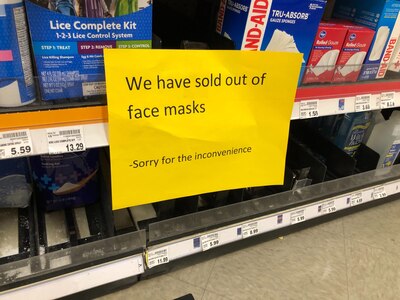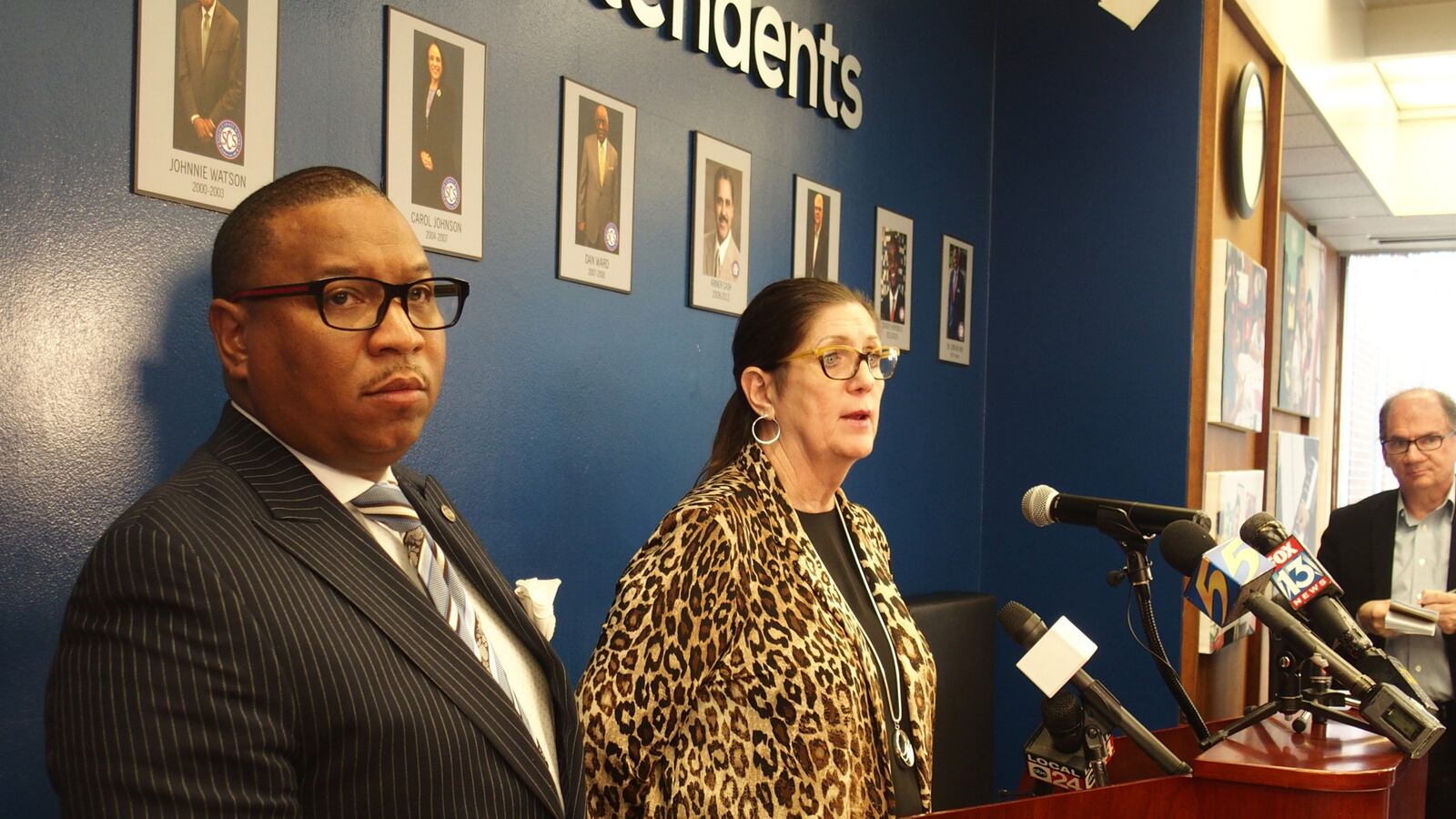Update, March 11, 2020: The Shelby County Health Department has cleared the employee to go back to work as of Tuesday evening, which marks 14 days since he came in contact with the COVID-19 patient. Superintendent Joris Ray said the employee is scheduled to return to work after spring break.
While some Memphis parents were satisfied with a “cautionary quarantine” of a school employee assigned to Treadwell Elementary and Treadwell Middle who came in contact with the area’s first COVID-19 patient, other parents are keeping their children home.
But delayed communication to Spanish-speaking parents and at least one Treadwell Middle School teacher urging students to call their parents to pick them up early from school created confusion and long car lines outside on Monday.
The Shelby County Health Department recommended the Shelby County Schools employee stay at home for 14 days to see if they develop any symptoms of the new coronavirus. If symptoms develop, the person will be tested, said Director Alisa Haushalter. So far, the employee has “not exhibited any signs or symptoms of illness following the contact” and currently poses “absolutely no risk” to students or staff.
Haushalter declined to identify the employee’s job title because of privacy concerns and would not say whether or not the employee had been at the school since coming into contact with the infected patient, who is one of four confirmed cases in Tennessee. The department has quarantined 70 people total in Tennessee and neighboring Mississippi as a result of the case confirmed Saturday evening.
“Quarantine is used out of an abundance of caution to prevent the spread of disease and contain the disease,” Haushalter said at a joint press conference with Shelby County Schools on Monday afternoon.

Tishina Miller, who has a daughter at the middle school and a son at the elementary school, said she is worried about taking off work if school closes because she does not have paid time off to take care of her children.
She’s balancing that with concern for her children getting infected — the district did not specify if students might have come in contact with the quarantined employee. So far, she has decided she will not send her children back until “I know there’s nothing serious and they clean the school top to bottom.”
She was off Monday and decided to pick up her children early after she drove past the school while running errands and saw a long line of cars as other parents picked up their children.
Eighth-grader Karely Camarillo said her class was kept in the school’s auditorium until around 10 a.m. She saw staff cleaning lockers when they returned to their classroom.
“I felt a little scared because other people can get the virus too,” she said.
Superintendent Joris Ray said, “It is critical that we fight fear with knowledge,” and announced all school-sponsored international travel is suspended for March and April. The district is also stocking schools with extra soap, paper towels, and disinfectant wipes, while implementing more thorough sanitization of frequently touched surfaces. Disinfectant wipes are available to teachers upon request, said Genard Phillips, the district’s chief of business operations.
“At this time there has been no decision to close schools. All Shelby County Schools are open for learning and instruction,” Ray said during the press conference. “We know right now there’s a great deal of concern about the unknown. This is unchartered territory, but I want to assure you that our team is capable and developing a detailed response plan.”
But the district’s initial response at the two Treadwell schools highlights the effects of not automatically communicating important school information in languages other than English. About 23% of Treadwell Elementary and Treadwell Middle students are learning English and nearly 40% are Hispanic, many of whom may have parents who are more likely to only speak Spanish.
Lori Gilbert, the president of Treadwell Elementary’s parent group, said some Spanish-speaking parents did not get the district’s robocall about the quarantined employee in Spanish until after school started. Gilbert said parents told her they received the Spanish message around 8:15 a.m. School starts at 8 a.m.
District officials acknowledged the message did not initially go out in Spanish, but said a Spanish message was sent before the school day began. One parent said her husband got a call in Spanish at 7:45 a.m. — 15 minutes before school started.
“I think the parents are very worried and cautious. And because of that, they need a lot of communication to help quell their fears,” Gilbert said. “They’re feeling very insecure and they need extra communication.”
Maria Delarosa, who has two children at Treadwell Elementary, signed out her two children around 11:30 a.m. after receiving the district’s robocall in Spanish.
“I don’t really want to send my children back until the school is clean,” Delarosa said as translated by her son.
Tennessee Department of Education guidance to districts regarding the new coronavirus emphasized the importance of addressing “potential language, cultural, and disability barriers associated with communicating COVID-19 information… Information you share should be easily understood by everyone.”

Language barriers can be challenging for school districts to quickly communicate information about the new coronavirus. In Chicago, a school aide tested positive and some parents at the school said they were relying on each other for communication in Polish and Spanish. In response, the district began including COVID-19 updates in Spanish, Polish, Urdu, Arabic, and Chinese on its website.
As school districts grapple with fast-changing news of COVID-19 cases, parents face difficult decisions about protecting their children. Gilbert decided to send her third-grade son to school Monday, but noted many of the parents she spoke with Monday morning did not.
“It ranges from people totally panicking and I think I’m on the other side of the swing. We just have to keep going til they tell us not to go,” she said.
COVID-19 is caused by one of a large family of coronaviruses — some of them cause the common cold — and is believed to have been an animal coronavirus that emerged to infect people.
The virus is thought to spread mainly between people who are in close contact with one another (within about 6 feet), through respiratory droplets from a cough or sneeze. It then enters the mouths or noses of nearby people. It also may spread by people contacting infected surfaces or objects then touching their mouth, nose, or possibly eyes.
The U.S. Centers for Disease Control reports that most confirmed COVID-19 cases in China, where the virus originated, have occurred in adults, although some infections in children have been reported.
Ray said the district “at no time shared guidance to dismiss school or have parents check out students.”
“A decision to close schools would not be taken lightly and will only be made after Shelby County Schools has consulted with our partners at the Shelby County Health Department,” he said during the press conference.
Shelby County Schools did not provide attendance numbers Monday for the two schools where the quarantined employee worked. The elementary school enrolls about 800 students; the middle school enrolls about 600 students, according to district data.
Even though Karely’s mother, Elisa Camarillo, did not plan to keep her children out of school after hearing about the quarantine through the district’s robocall, she changed her mind after one of Karely’s teachers told students to call parents to pick them up.
“It was no big deal because they took the person to quarantine,” Camarillo said about her reaction to hearing the news.
Keishana Barnes, a Treadwell Elementary parent, said her family decided to keep her first-grader at home Monday “because we didn’t have a lot of detail. So, we ended up erring on ‘better safe than sorry’ until we get more information.”
After listening to some of the press conference online, Barnes said not all of her concerns were addressed.
“It’s not new information, just very general information that we’ve already received. It was information that could have been received anywhere, in any city,” she said, adding she’s not sure what information would make her feel safe.
“We’ll just take it hour by hour,” she said.

